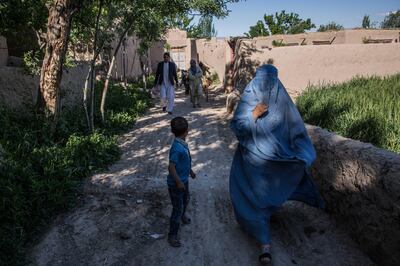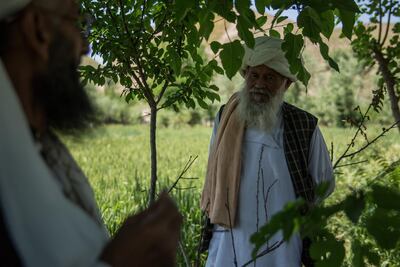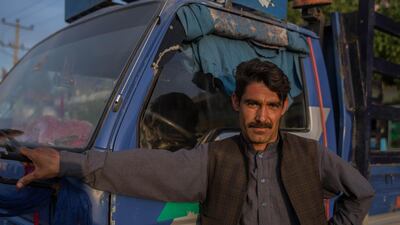Kidnapped at gunpoint, Shir Aga was held in a dry well with no food and little water for 13 days before he sold his truck, paid a ransom and was finally released.
The 28-year-old lorry driver – jobless after selling his truck – reported his case to the police and the government’s National Directorate of Security last year. After weeks of waiting, no progress had been made. At best, he was told, his kidnappers would be taken to jail, but he likely would never see his money again.
Strapped for cash, Mr Aga opted for Plan B: He approached a Taliban court near his village in Gulran district in rural Herat, detailing what had happened to him. Within a day, his assailants were captured, put in a Taliban prison, and Mr Aga’s money was returned.
Across the country, an increasing number of Afghans are seeking justice in ad hoc Taliban courts, citing frustration with the state’s bureaucracy, corruption and lengthy processing times. In Taliban controlled territories – nearly half of the country these days – these courts can be set up anywhere from a back room in a mudbrick mosque to an outdoor gathering in the desert.
Mr Aga, who used to be a local policeman, grins widely as he recalled the proceedings. “I told the Taliban about the kidnapping and within six hours, they were able to capture them [the perpetrators] and lock them up. I told the judges I’d forgive the kidnappers, otherwise they would have cut off either their hands or legs,” he said. “I bought another truck and was able to go straight back to business.”
The driver says he has recommended Gulran’s Taliban court to both friends and family, describing it as a book-filled mosque lined with thick pillows to sit on and three bearded Talibs in traditional dress – a lawyer, a judge and a mufti – ruling over each case.
"It was fast, free and I didn't have to pay any bribes," he tells The National from Herat, where he currently lives with his family.

The province’s governor Rahimi Abdul Qayum admits that Mr Aga’s case is not an exception.
“We don't have enough resources to process things quickly, but there are thousands of cases solved in our courts and justice is done. We don't just kill people off," he said, referring to the often harsh judgments meted out by the Taliban.
“If some go to the Taliban, there’s nothing we can change. Kidnappers and drug lords are often in Taliban areas, so they might be able to arrest them quicker.”
Informal justice has a long pedigree in Afghanistan, where tribes often play a role in resolving conflict.
The southeast of the country is traditionally knows as the "land of jirgas", after the traditional meeting of elders where disputes can be resolved, explains Murtaza Haqiqat, a lawyer with Afghan NGO The Liaison Office and a long-term researcher on the topic.
This form of tribal justice is usually administered verbally and informally.
“The Taliban courts are different,” Mr Haqiqat said. “They are organised and documented and it’s often mullahs and religious leaders who act as judges and lawyers, enforcing sharia law.”
These courts, he says, provide a connection between the Taliban and the community and even help the group with their recruitment process. But it is often unqualified and uncertified ‘lawyers’ who work there.
“Their decisions can be just at times, but many haven’t extensively studied the Quran’s sharia law, so it’s often their own interpretation,” Mr Haqiqat said, noting that even government legislation is based on Sharia.
But the Taliban continue to draw people to what the government refers to as "desert courts" and between traditional jirgas and the Taliban, half of the 37-million strong nation seek informal justice.
“In areas that we control, our court is the only option,” explained Mullahwi Mohammad, the Taliban’s Head of Recruitment in Badghis Province.
“Here in Badghis, we have a military, provincial and district court. At the military court, the community can complain about Taliban fighters, while the other courts are for regular cases,” he said, added that no bribes or charges are taken by the Taliban.
The most common cases heard by the Taliban’s Badghis courts involve divorces, land disputes and robberies.
Badghis is a northwestern province where the Taliban has made recent territorial gains. Civilians there often live their lives amid ongoing fighting.

Famer Adbul Rahim, 67, lives right on the frontline. Half of his crops grow in government controlled areas, while the other half are on the Taliban side. Speaking from his field in a government-controlled part of Badghis, Mr Abdul Rahim pointed towards a grassy hillside a few hundred metres away. “They’re just behind there,” he said, referring to the nearest Taliban positions.
The only difference between the two sides, says the turban-clad farmer, is that the Taliban tax him 10 per cent on his produce. He currently pays no tax to the government.
Mr Abdul Rahim, who is illiterate, says seeking justice through the Taliban avoids the lengthy bureaucratic process typical in government courts.
“My distant relatives solved their land disputes with the Taliban’s help,” he explained, but added that their justice can be draconian.
Cruel punishments including amputations and subjective Quranic interpretations often at odds with more mainstream jurisprudence are common. Mr Haqiqat says that while the Taliban continues to rely on “outdated” interpretations, the Afghan legal system lacks both the integrity and qualified staff to reliably offer a better alternative.
Speaking of the government, he said: “They make rules and break them themselves."
His research from 12 of Afghanistan’s 34 provinces shows that more than 63 per cent of government prosecutors have only a high school diploma.
“It’s a problem. The state's legal system is fraught with corruption and the Taliban courts often make on the spot judgments. Neither is good.”
But with the majority of the population still living in rural areas – the country has a literacy rate of less than 40 per cent – most people opt for alternative justice.
Nejila, a 35-year-old woman who lives in a government-held area in Badghis province, says the most effective system is still local conflict resolution.
“Most conflicts are solved with the village elders and that’s whose judgement we trust,” she said.
With ongoing peace talks and a surge in violence in recent weeks, Mr Haqiqat admits that informal justice is still very functional compared to the state’s approach. “One thing is clear. We can’t sideline the informal justice system.”

